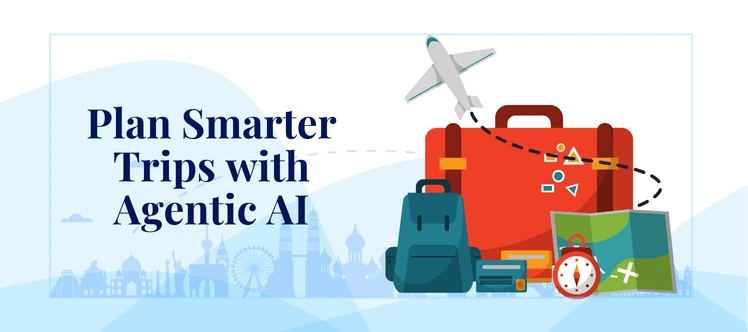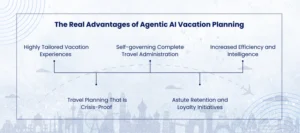
How Agentic AI Vacation Planning Transforms Your Trips
Experiences have always been the focus of travel, but modern tourists demand more than just convenience—they want trips tailored to their tastes. Agentic AI in travel planning is revolutionizing the travel business in this regard. Autonomous AI agents think, decide, and act with intent, which makes every trip smarter and more personalized than traditional apps that adhere to strict rules. Agentic AI vacation planning is opening new possibilities for travel and hospitality firms, from real-time itinerary modifications and booking assistance to predictive customer support and loyalty benefits. The potential of agentic AI trip planning services, implementation best practices, and the reasons why companies need to take immediate action to remain competitive will all be covered in this blog.
What Is Agentic AI Vacation Planning?
Let’s first examine what agentic AI vacation planning entails before delving into how it will change travel.
Agentic AI vacation planners are powered by autonomous AI agents that can make decisions, learn from feedback, and adapt in real-time, unlike common AI devices that merely respond to prompts. Such systems are ideal for the fast-changing travel business as they work proactively towards achieving pre-determined goals as opposed to responding passively.
Think of them as your personal AI travel buddies. They can plan your itinerary, suggest destinations to visit, and even adjust your travel itinerary based on last-minute revisions, local happenings, or weather forecasts. This degree of flexibility gives intelligent vacation planning with AI agents a new meaning.
Why Agentic AI Vacation Planning Is Transforming Travel
Consider the hours you spent researching ticket costs, reading many hotel reviews, examining cancellation conditions, and locating local experiences the last time you organized a trip. Imagine now giving all of that to a travel planner powered by an agentic AI that not only helps but also fully comprehends your intentions and takes command. Agentic AI vacation planning holds that promise.
This reform is revolutionary for businesses and passengers alike for the following reasons:
Changing Expectations of Travelers
Sixty-three percent of travelers want brands to swiftly adjust to their specific demands, per a Salesforce survey. This is made possible by agentic AI travel planning services. In order to provide timely, relevant, and personalized travel recommendations, agenctic AI vacation planning solutions examine historical preferences, behavioral patterns, and contextual cues.
Making Operational Complexity Simpler
Behind the scenes, hospitality companies deal with issues like personnel shortages, volatile pricing, and disjointed technology. By integrating data from revenue management, staffing, and guest services, intelligent vacation planning with AI agents is made easier. Decisions are made more quickly and intelligently without overtaxing human teams.
Proactive Guest Personalization
Generic recommendations are no longer the only kind of personalization. Travelers can receive customized offers from personalized AI holiday assistants, such as flexible check-in options based on previous stays or spa bonuses for regular wellness visitors. Instantaneous system adaptation results in genuinely one-to-one experiences.
Navigating Uncertainty in Travel with Ease
Travel can be disturbed by cancellations, weather conditions, or global disruptions, as travel is ever-unpredictable. With monitoring of real-time indicators and self-organizing route adjustments, accommodation bookings, or alerts being sent within time, agentic AI trip planners shine here. With smart vacation planning with AI agents, companies maintain faith as travelers stay stress-free.
10 Ways Agentic AI Vacation Planning Is Revolutionizing Travel
The objective of agentic AI vacation planning is to deliver more intelligent, resilient, and personalized travel experiences instead of merely booking a trip. Companies can expect customer needs, respond immediately to disruptions, and deliver loyalty-driven services by utilizing self-sufficient AI agents that learn, adapt, and operate in real-time. Agentic AI holiday planners and customized AI holiday attendants are transforming the travel and hospitality industry in the following 10 real-world ways:
Active Management of Disruptions
Holidays don’t need to be sabotaged by sudden weather conditions, flight cancellations, or delays. Real-time disruption alerts, flight rebooking, rapid updates, and even hotel vouchers are all made available by agentic AI vacation planning systems, which ease stress and build trust.
Extremely Tailored Travel Arrangement
Smart vacation planning with AI agents customizes plans to each traveler’s specific preferences, whether those be luxury getaways or low-cost excursions, rather than making general recommendations. Because of the system’s constant adaptation, planning is simple.
Adaptive Pricing to Increase Revenue
Static price is no longer relevant. Hotels and airlines can use autonomous AI agents to dynamically modify prices in response to demand, rival rates, or booking patterns. This maximizes revenue prospects and guarantees competitive offerings.
More Astute Engagement with Loyalty
Conventional point systems frequently fall short in establishing an emotional bond with passengers. AI vacation assistants that are tailored to each consumer can anticipate disengagement, provide benefits that increase brand loyalty, and prod clients with pertinent offers.
Immediate AI-Assisted Customer Service
Today’s travelers demand answers. Agentic AI trip planners allow virtual assistants to serve as round-the-clock concierges, offering smooth, real-time assistance with anything from restaurant recommendations to hotel rebooking.
Simplified Hotel Management
Using AI agents to plan vacations intelligently helps improve tasks like housekeeping, maintenance, and scheduling. AI makes sure resources are allocated effectively by evaluating demand signals, which raises visitor happiness and lowers operating expenses.
Automated Checks for Safety and Compliance
In terms of guest service, health, and food safety, compliance is essential. Real-time system monitoring by autonomous AI agents helps brands stay out of trouble and preserve consumer trust. Smart vacation planning with AI agents helps in identifying infractions and initiating remedial measures before problems worsen.
Management of Predictive Inventory
Agentic AI vacation planning guarantees that the proper stock is always accessible for everything from hotel minibars to aircraft amenities. By anticipating consumption patterns, waste and shortages can be avoided, increasing sustainability and efficiency.
Opportunities for Contextual Upselling
When done correctly, upselling no longer feels forced. Travelers can receive timely, relevant offers from personalized AI holiday assistants, such as lounge access before a delayed flight or a spa discount during check-in. This improves the journey and increases income.
Effective Cross-Channel Marketing
Through the analysis of consumer behavior across email, SMS, and push notifications, agentic AI trip planning services optimize marketing campaigns. It increases engagement and lessens marketing fatigue by guaranteeing timing and relevance.
The Real Advantages of Agentic AI Vacation Planning

Travel brands may move from merely serving clients to anticipating their requirements and taking proactive measures since agentic AI vacation planning systems have goals, evolve constantly, and make decisions on their own. Travelers will find these encounters effortless, and businesses will find them effective.
Here are some real-world examples of how agentic AI travel planning services function:
Highly Tailored Vacation Experiences
Personalized AI holiday helpers generate distinct micro-profiles in real time, in contrast to rule-based segmentation that divides visitors into “business” and “leisure” travelers. For instance, a person may value Wi-Fi and quick check-ins when traveling for work, but prefer boutique accommodations when on vacation. Agentic AI trip planners instantly adjust to these preferences.
Self-governing Complete Travel Administration
Consider a self-governing artificial intelligence (AI) agent that arranges your travel, verifies your visa needs, tracks delays, and even recommends travel insurance without your request. This enhances customer satisfaction, boosts upsell prospects, and lessens reliance on human employees for firms.
Increased Efficiency and Intelligence
In the hospitality industry, manual input is often used in tasks including staff scheduling, inventory forecasting, and housekeeping. Through intelligent agentic AI vacation planning, hotels may evaluate local events, demand signals, and weather updates in real-time to optimize operations before issues arise.
Travel Planning That Is Crisis-Proof
Travel is prone to delays, ranging from pandemics to last-minute cancellations. Agentic AI vacation planning speeds up and improves the empathy of crisis management. It can manage cancellations, recommend different hotels, and redirect visitors during storms, keeping both businesses and travelers stress-free.
Astute Retention and Loyalty Initiatives
Loyalty is no longer increased by generic incentives. Offers can be highly customized using Agentic AI travel planning services, such as spa benefits for wellness travelers, surprise birthday upgrades, or early check-ins for regular travelers. These encounters convert one-time clients into ardent supporters.
Best Practices for Agentic AI Vacation Planning: Do’s and Don’ts
Both how businesses provide services and how travelers plan their trips are being revolutionized by agentic AI vacation planning. Autonomous AI agents provide intelligence and personalization to every aspect of the travel experience by making decisions, learning continuously, and adapting in real time. Organizations must, however, properly adopt these systems if they hope to have a significant influence. Strong data foundations, fair supervision, and constant improvement are essential for success.
The following are crucial dos and don’ts for successfully adopting agentic AI trip planning services:
Dos for Successful Implementation
Begin with Use Cases That Provide Explicit Benefits
Start with examples that offer advantages right away. Customer satisfaction is directly increased, and manual workloads are decreased when an agentic AI trip planner is used to handle interruptions. Starting with high-impact use cases generates internal momentum and aids with ROI demonstration.
Assure Smooth Integration and High-Quality Data
Clean, real-time data from several systems, including booking platforms, CRM platforms, hotel databases, and support channels. It is necessary for intelligent agentic AI vacation planning to be successful. The system is guaranteed to offer precise, context-aware recommendations when it has high-quality integrated data. The passenger experience is weakened, and trust is diminished by inaccurate or compartmentalized facts.
Continue to Monitor Human Oversight
The majority of activities can be completed by individualized AI vacation assistants, but in certain situations, human judgment is needed. For example, human inspections are necessary to prevent mistakes like booking unavailable rooms or processing cancellations incorrectly. This equilibrium protects consumer confidence and guarantees a more seamless integration of AI-powered procedures.
Give explainability and transparency top priority
The rationale for specific enhancements or recommendations must be made clear to travelers. By giving concise justifications for its choices, an open Agentic AI vacation planning system increases trust. This guarantees regulatory compliance, lowers escalations, and boosts consumer confidence.
Continuously Pilot, Measure, and Iterate
Risks might arise from extensive rollouts without testing. Organizations can get feedback, improve workflows, and adjust decision-making logic by testing Agentic AI trip planning services in controlled circumstances. Customer satisfaction and long-term efficiency are guaranteed by iterative improvement.
Don’ts to Avoid with Agentic AI
Avoid Demanding Full Autonomy Too Early
It may have adverse effects to grant full autonomy to AI systems before thorough testing. For example, making whole itineraries over again in case of bad weather without human checks can lead to errors, inconvenience passengers, and damage a brand’s reputation.
Be Vigilant About Compliance and Data Privacy
Protecting client data is necessary in the hospitality and travel sectors. When relying on autonomous AI agents, violating privacy regulations such as the CCPA or GDPR will attract costly fines and erode consumer trust. Compliance must be built into the system from the outset.
Agentic AI should not be configured once
With every interaction, holiday-planning agentic AI technologies evolve. Left untamed, the decisions will potentially drift away and yield outcomes that are not aligned with customer needs or business goals. Accuracy and justice need to be upheld by incessant observation and adaptation.
Avoid Relying on Just One Data Source
Personalization is diminished when AI is restricted to internal booking history. A variety of data sources are taken into account by efficient agentic AI trip planners, such as rival prices, local events, weather forecasts, and even real-time traveler behavior. This wide viewpoint guarantees that suggestions stay accurate, current, and dynamic.
Conclusion
Anticipating client requirements before they ever materialize is key to the future of travel. Travel and hospitality companies may now offer flexible, individualized, and effective experiences at scale thanks to agentic AI vacation planning. In order to accomplish this, businesses require the proper framework, where Salesforce development services are essential for integrating customer data, streamlining processes, and enabling sophisticated AI-powered systems. By fusing Salesforce with innovative agentic AI, we at AnavClouds Software Solutions assist companies in realizing this promise. Are you prepared to improve customer loyalty, optimize processes, and develop cutting-edge travel experiences? Together, let’s shape the travel industry of the future.


